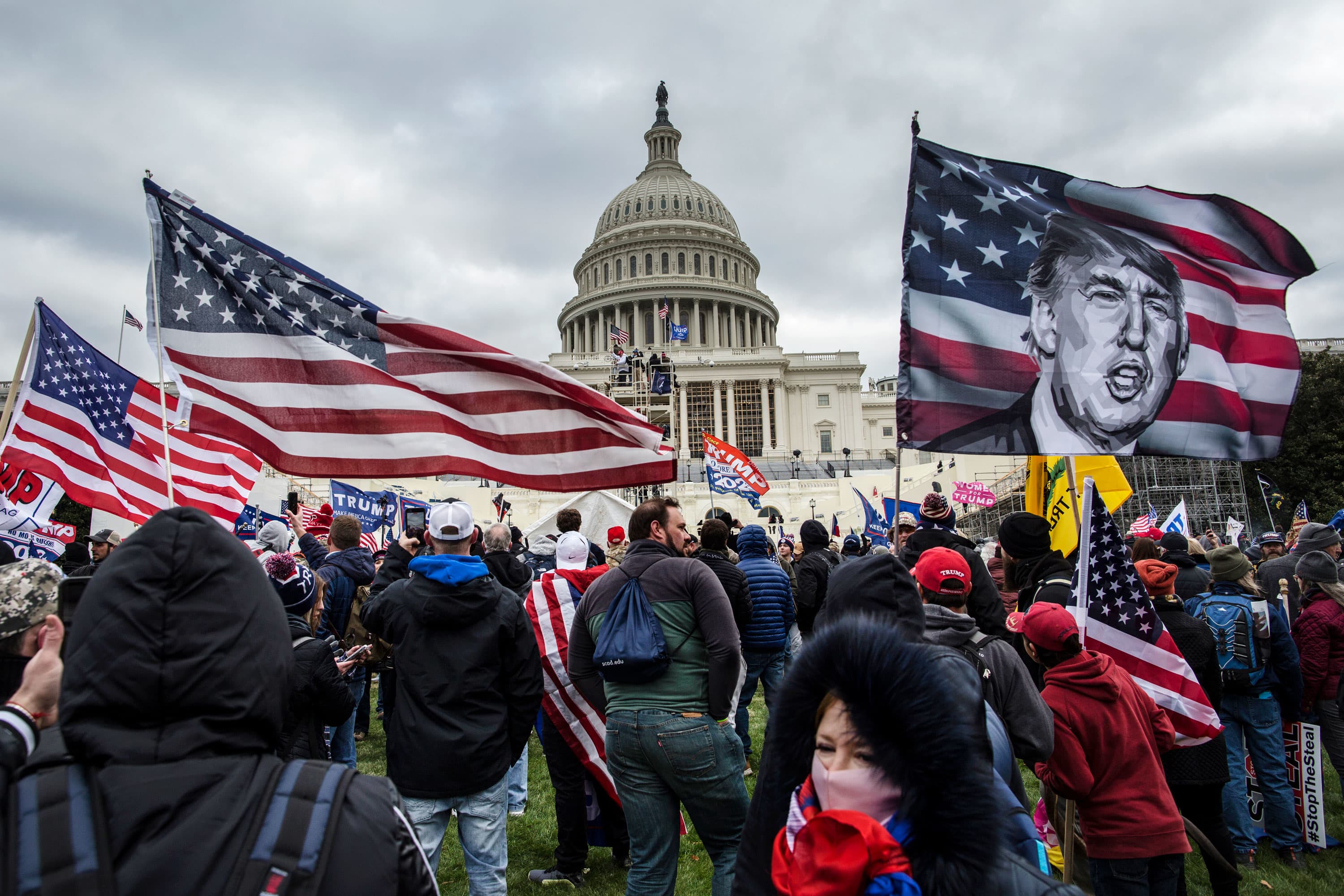
US President Donald Trump’s supporters gather outside the Capitol building, January 6, 2021.
Probal Rashid | LightRocket | Getty Images
Fundraisers for congressional candidates and party campaign arms have been lobbying corporations to resume donating after many suspended their political contributions, according to people familiar with the matter.
Dozens of corporations at least temporarily paused donations from their political action committees after the Jan. 6 Capitol Hill riot that led to at least five deaths. That day, more than 145 Republican lawmakers, encouraged by then-President Donald Trump, voted to dispute the results of the Electoral College certifying Joe Biden as the next president.
Most companies have since said that they are reviewing their PACs’ policies on who they give to in the future. Some companies decided to pause contributions for an indefinite period of time, or up to six months, to GOP lawmakers who challenged the election results. Other businesses opted to suspend donations to candidates across the political spectrum.
These corporate PACs can usually give $5,000 to a candidate and around $15,000 to a national party committee.
Fundraisers for individual candidates running for reelection in Senate and House races, along with those raising cash for the the Democratic Congressional Campaign Committee, the Democratic Senatorial Campaign Committee, the National Republican Congressional Committee and the National Republican Senatorial Committee have reached out to various corporations to encourage them to remove their restrictions and resume contributing, the people said.
The NRCC recently put together a list of corporate donation policies, which fundraisers expect to use as a tool to coax companies into giving again, one of the people said.
People and groups with ties to Senate Minority Leader Mitch McConnell, R-Ky., have been actively reaching out to corporations to get them to start giving again, another person said.
Representatives for the congressional committees did not return requests for comment. Some companies did not deny that they had been contacted by political fundraisers.
Computer giant Dell doesn’t intend to revisit its decision.
“We have no plans to revisit the decision to suspend contributions to members of Congress whose statements and activities during the post-election period weren’t in line with Dell Technologies’ principles,” a company spokesperson told CNBC. “Our employee-led PAC board meets regularly to discuss current events and to vote on key decisions like changes to PAC contributions. All PAC contributions are a matter of public record so you will be able to stay informed on any future updates.”
Representatives for JP Morgan and Citigroup said both banks are continuing to review their policies, declining to comment further. They had both paused and started reevaluating their PACs’ contributions.
A spokesman for Goldman Sachs said they had not heard from anyone yet regarding when the bank might start making contributions again. A spokeswoman for USPS said their stance on pausing contributions is unchanged and that to her knowledge the company has not heard from anyone on the matter.
Several other companies including, Amazon, Facebook, AT&T and Marriott, did not return requests for comment.
Candidates are starting to gear up for the 2022 midterm elections, during which a third of the Senate and all of the House will be up for grabs. The elections are expected to be expensive, and fundraisers believe they need corporate money to pad campaign coffers.
The Democrats have a slim majority in the Senate and have 14 seats up for reelection in that chamber. Republicans have 20 Senate seats up for reelection, including Sen. John Kennedy, R-La., who challenged the election results. Cook Political Report ranks his seat as “solid Republican.” Sens. Josh Hawley, R-Mo., Ted Cruz, R-Texas, and other senators who pushed back on the election results aren’t up for reelection next year.
Axios reported that the NRSC had the most success with digital fundraising using Hawley’s name compared to any other senator, with the exception of the committee’s chairman, Sen. Rick Scott, R-Fla.
Democratic fundraisers are urging companies to get back to giving by citing their determination to oust the Republican lawmakers who encouraged and espoused the false election narrative that triggered the Jan. 6 rally and riot.
Republican fundraisers, on the other hand, have warned donors about Democrats’ intention to raise the corporate tax rate.
Since the riot’s aftermath, some companies and business groups have come forward with their plans for the midterm campaign.
In February, Microsoft announced its PAC would “suspend contributions for the duration of the 2022 election cycle to all members of Congress who voted to object to the certification of electors.” The company added that the PAC would “suspend contributions for the same period for state officials and organizations who supported such objections or suggested the election should be overturned.”
The Chamber of Commerce announced in a March memo that it would not continue its ban on contributing to lawmakers who challenged the election results. The business advocacy group said it would “evaluate our support for candidates – Republicans and Democrats – based on their position on issues important to the Chamber, as well as their demonstrated commitment to governing and rebuilding our democratic institutions.”
“We do not believe it is appropriate to judge members of Congress solely based on their votes on the electoral certification,” the Chamber added in the memo.




